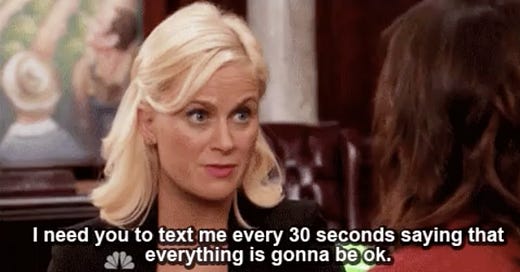A phobia: anxiety and fear about something that is unlikely to do you harm.
All phobias are grounded in anxiety but according to medical definitions, a phobia is a baseless or irrational fear of something. In other words, an overreaction. And given the sustained level of fear we’ve all had for this election, I can’t say I agree that we’re all overreacting.
This year I chose to vote early because I am afraid. Not only that Biden and Harris will lose, but: I’m afraid of Election Day as a potential super-spreader event, afraid of Election Day interference of some kind, afraid of what might happen now that Trump has planted the seeds for election anxiety.
It’s been helpful for me to break these fears into categories, however vague they might be.
*
Agoraphobia: the fear of leaving your house and going out in public.
Amanda Mull meditates on this specific worry in her essay, “The Difference Between Feeling Safe and Being Safe,” for The Atlantic, reminding us: “When everyone is left to write their own version of Choose Your Own Pandemic Adventure, no one is safe.”
The fear of voting that may inadvertently expose or undermine undocumented loved ones. The fear of one’s address potentially becoming public information (and, chillingly, as Isabelle Kohn reports for MEL, pose a serious threat for survivors of intimate partner violence and stalking). The fear of voting that may inadvertently obscure the rights and dignity of undocumented loved ones.
*
Capiophobia: the fear of police
Specifically, that fear of police violence and intimidation at polling places.
The rising threat of voter intimidation by Proud Boys, militia members, and extremists. There’s already been a foiled plot to kidnap Michigan governor Gretchen Whitmer by militia members earlier this month. Clashes with antifa protestors, as amorphous as they may be, don’t inspire much hope for nonviolence.
The fear of what policing looks like in this country if we are subjected to another 4 years of this presidency.
*
Sociophobia: fear of social evaluation
The fear of potentially violent civil unrest in the streets if the election results are contested or too close to call. This was explored in depth during the latest episode of Radiolab, “What If?,” in which political and media professionals gameified potential election results, gave me nightmares.
The fear of potentially violent civil unrest if the election results are not contested.
The fear that, no matter how much phone banking and text banking and donating and volunteering, you won’t make enough of an impact to change the course of the election. The fear you’ll leave a social stone unturned that could change the outcome of everything.
*
Phobophobia: the fear of fears
The fear that we’ll be faced with a coup, and even more fear that we’ve ever felt before. Yet another nightmare-inducing podcast episode from the New York Times’ The Daily spells out this possibility in frightening detail as they follow first-time gun-buyers in North Carolina and Washington state concerned for their safety post-election.
Fear we might just have to use the Hold the Line Guide compiled by activists and researchers to defend our country’s democracy after all.
Fear that our fear will paralyze us rather than unite and mobilize us.
*
Trumpophobia: the fear of Trump’s re-election, what it will mean for all of us
Despite, or perhaps because of a combination of all of these fears, I voted early this week. I showed up to the polls in Brooklyn an hour before they opened on a rainy, crisp morning.
When I arrived at my early voting location (the Brooklyn Museum) the line was already snaking almost all the way around the building. People had shown up with folding chairs and stools, umbrellas, books, iPads, cell phone chargers and snacks. Volunteers were passing out warm sandwiches, snacks, water, and chairs for those who needed them.
Overall, the experience was pleasant: I made small talk with the folks I stood in line with for two and a half hours. The poll workers were incredibly patient, generous, and kind. Knowing I was filling out my ballot and doing my part was, as always, worth the hours-long wait and then some.
Usually, I love voting in-person during elections for exactly this reason. Voting and civic duty like this can bring out the best in people and the best in communities. And in my community, this was the case.
But I’m now afraid that this could be the last pleasant election-related interaction I have for a long, long time. I didn’t feel the uplifting sense of progress and history in the making that I did in 2016, more a sense of duty underlined by dread.
Someone at the Brooklyn Museum had placed a portrait of Supreme Court Justice Ruth Bader Ginsburg not far from the voter privacy booths. She looked on while we all cast our ballots and shuffled out the door with “I Voted Early!” stickers stuck to our coats. Seeing our hometown hero RBG was a small comfort in a deeply uncertain time. And I can only hope we’ve made her proud.





